Plantations lift villages out of poverty in Hebei
Updated: 2016-04-27 11:41
By Wu Yan(chinadaily.com.cn)
|
|||||||||
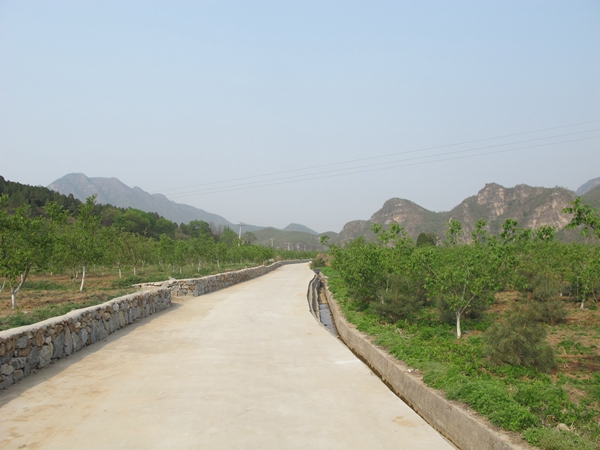 |
|
A newly-built road winds through a walnut plantation in Tiangang village, Angezhuang township, Yixian county, Hebei province, on April 27, 2016. [Photo by Wu Yan/chinadaily.com.cn] |
Just two years ago, there was neither road nor trees where a walnut plantation now grows in Tiangang village, Angezhuang township, Yixian county, Hebei province, a mountainous area about 150 km away from the center of Beijing.
"We planted walnut trees in the spring of 2013 using poverty relief funds earmarked by the government," said Yu Changzhi, Party secretary of Tiangang village. Today the plantation has expanded to 500 mu (33.3 hectares) with more than 35,000 walnut trees.
"The village has very favorable natural conditions with a lake and a river nearby", said Yu. The village also uses the funds to build and renovate roads totaling 5,000 meters and build a 1,500-meter-long diversion canal, good infrastructure for supporting the plantation.
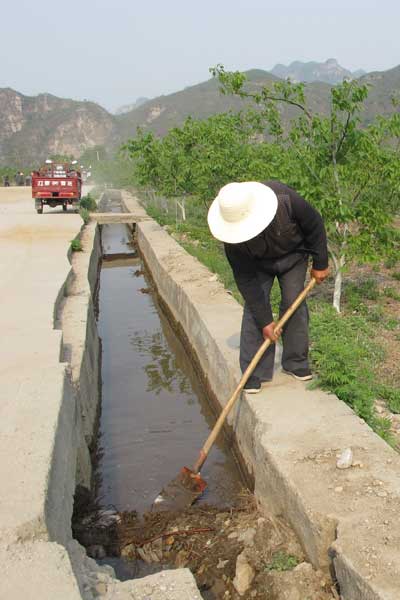 |
|
A villager cleans a diversion canal in a walnut plantation in Tiangang village, Angezhuang township, Yixian county, Hebei province, on April 27, 2016. [Photo by Wu Yan/chinadaily.com.cn] |
According to the village's development plan, the walnut trees will be able to produce 200 kg of walnuts per mu in 2017. The whole plantation is expected to produce 2 million yuan ($308,200) worth of walnuts. In addition, the income from an orchid cultivation base which is also under development in the plantation, so that the village will be able to climb out of poverty by 2020.
"If a village wants to eliminate poverty and become rich, it has to develop its own industry first," said Yu.
The Thirteenth Five-year Plan has set the goal to relieve people from poverty in rural areas across the country by 2020.
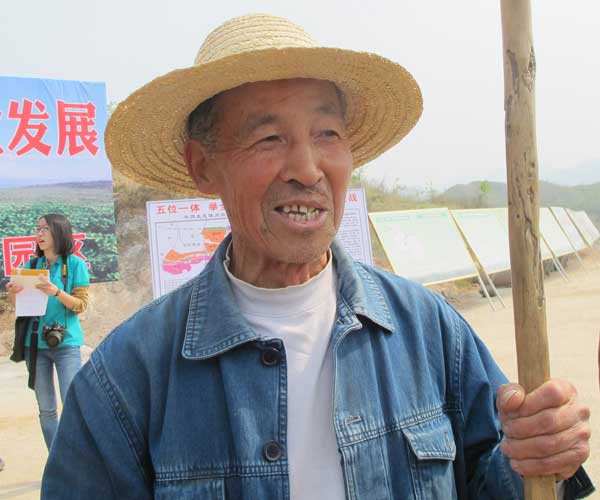 |
|
The photo shows Chen Dianying, a 71-year-old native farmer and a member of a poverty-stricken household, in Taidi village, Niugang town, Yixian county, Hebei province, on April 27, 2016. [Photo by Wu Yan/chinadaily.com.cn] |
"I see a promising future and I am motivated to work in the plantation," said 71-year-old Chen Dianying, a native farmer and a member of a poverty-stricken household, in Taidi village, Niugang town, Yixian county.
Similar to Tiangang village, Taidi village built its own plantation but has chosen to grow apples due to its unique natural conditions.
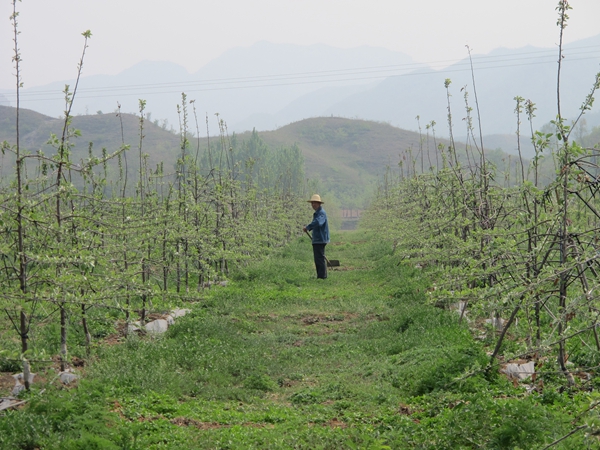 |
|
Chen Dianying works at an apple plantation in Taidi village, Niugang town, Yixian county, Hebei province, on April 27, 2016. [Photo by Wu Yan/chinadaily.com.cn] |
He has been employed to do farming work on the plantation for three years, after transferring the usage rights of his land to a villager-run rural cooperative to build the plantation and became a shareholder. This model has become a widely-adopted development model among Hebei's poverty-stricken villages.
"I can earn money and also look after my sick wife," said Chen.
He now earns thousands of yuan more from the work and dividends on the land shares every year, besides allowances offered by the government, enough to support his family.
Villages and their residents are not alone in benefiting from the plantation.
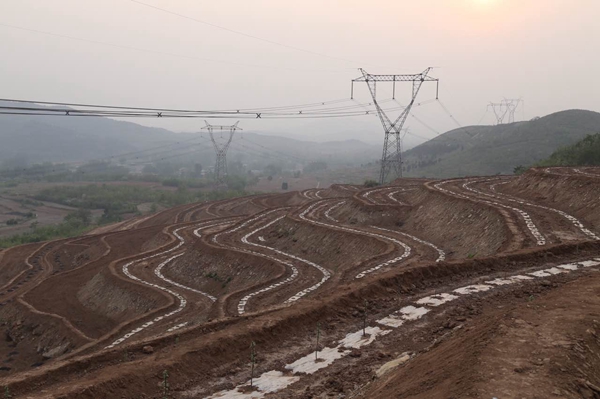 |
|
A view of a modern agricultural plantation in Xiahuanghao, Lianggezhuang township, Yixian county, Hebei province, on April 27, 2016. [Photo by Kou Jiaxiang / Provided to chinadaily.com.cn] |
Some companies have taken over the role of villager-run rural cooperatives in some villages. Villagers transferred their land to a company and got shares in exchange, while the company is in charge of managing the plantation and giving out dividends.
"The merits of the plantation dwarf its shortcomings," said Wang Hongwei, manager of Hebei Lvzenong plantation company, "though the company invests a large amount of money and the production cycle is long, it can get government subsidies and sustained returns."
The company manages a modern agricultural plantation which plans to cover 13,000 mu of area involving five villages in Lianggezhuang township, Yixian county. It has already planted 500 mu of cherry trees and 2,500 mu of apple trees with an estimated prime revenue of more than 3 million yuan.
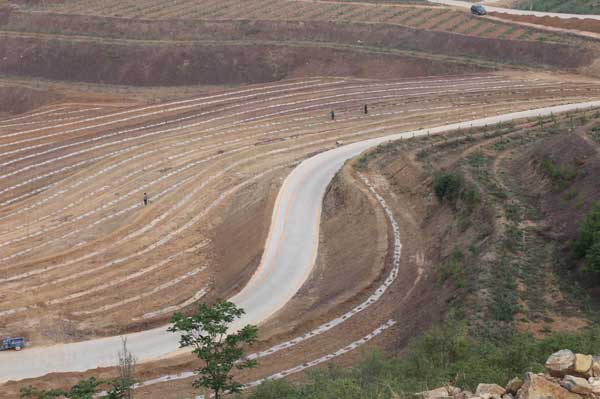 |
|
A view of a modern agricultural plantation in Xiahuanghao, Lianggezhuang township, Yixian county, Hebei province, on April 27, 2016. [Photo by Kou Jiaxiang provided to chinadaily.com.cn] |
Wang said that the company plans to initiate deep-processing factories in the plantation and chicken and pig farms are also in operation to build a circular economy. The plantation is expected to be upgraded into a tourist destination in several years.
"The rural market is now surging", said Wang, "the company hopes to earn money from the market. But the most important point is that villagers will never face poverty again."
Related Stories
On-the-ground report: How Hebei is tackling poverty in 'green' way 2016-04-26 11:31
Hebei's poverty-stricken village gets new look after Xi's visit 2016-04-26 11:28
Discovering Hebei 2016-04-25 08:36
Today's Top News
Beijing least affordable city in the world to rent
US accused of 'hyping up' military flights
Banks offer passport to integration
Obama casts doubt on post-EU deal
Chinese runners flood London for marathon
Chinese philanthropists explore British way of 'giving'
Back on the up
China leads way on US adoptions
Hot Topics
Lunar probe , China growth forecasts, Emission rules get tougher, China seen through 'colored lens', International board,
Editor's Picks

|

|

|

|

|

|







